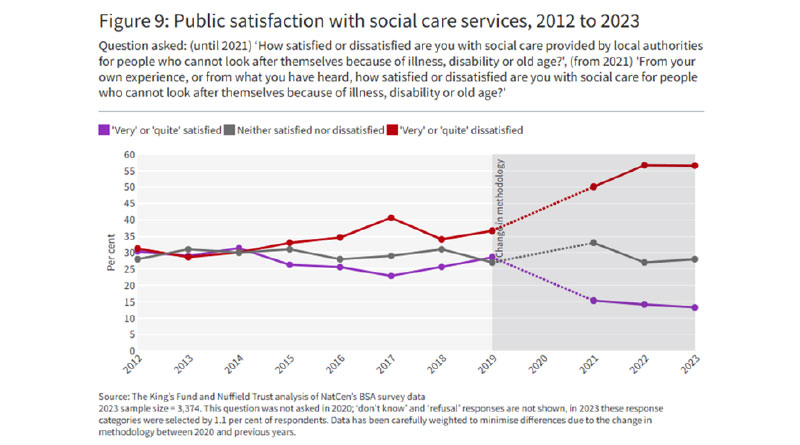British Social Attitudes Survey: Public Satisfaction With Social Care Hits New Low
New findings from the British Social Attitudes survey, published by the Nuffield Trust and The King’s Fund, show that public satisfaction with social care services has dropped to just 13 per cent, the lowest level ever recorded.
The survey, carried out by the National Centre for Social Research (NatCen) in September and October 2023, is seen as a gold standard measure of public attitudes in Britain.
The latest results show the proportion of people dissatisfied with social care remains at a historically high level. 57 per cent of respondents reported being either ‘quite dissatisfied’ or ‘very dissatisfied’ with social care services.
The leading reason given for dissatisfaction was inadequate pay, working conditions and training for social care workers (57 per cent). This was closely followed by people not getting the social care they need (56 per cent), and there not being enough support for unpaid carers (49 per cent).
Dissatisfaction was markedly higher among respondents who had used or had contact with social care services (for either themselves or someone else) in the past 12 months (64%) compared to those who had not (49%.).
Dissatisfaction with social care services varied considerably between demographic groups. Respondents aged 65 and over were more dissatisfied (63 per cent) than respondents aged 18–64 (55 per cent). Those in the highest income quartile were more dissatisfied (62 per cent) than those in the lowest (51 per cent).
There is a notable difference in party affiliation, with both Labour and Liberal Democrat supporters saying they are more dissatisfied with social care services (both 62 per cent), than Conservative supporters (51 per cent).
The social care findings from the British Social Attitudes survey have been released ahead of the full health and care report publishing on Wednesday 27 March.
Simon Bottery, Senior Fellow in social care at The King’s Fund, said: ‘These are awful results, but they are sadly unsurprising. For many years governments have taken too little action on social care and this is now seriously affecting those who draw on services, the families who support them and the staff who work in the sector. People realise that too many people fail to receive the social care support they need, putting an unfair requirement on unpaid carers, and that staff are overworked and underpaid.
‘The results demonstrate the need for immediate action to stabilise the social care system, backed by long-term reform and investment. The next government must take a strong step forward and prioritise social care.’
Cyril Lobont, Researcher at the Nuffield Trust, said: ‘Social care services are a vital part of society yet satisfaction with them seems to redefine ‘rock bottom’ every year. The results make it clear that too many people with care needs and their families are still struggling to access a reasonable level of support. Politicians of all parties need to prioritise reversing this record low satisfaction. What is left of the delayed reform plans at present would barely stabilise the sector, let alone deliver the improvement so desperately needed.
‘Even though social care services are far less visible to the average person than the NHS, well over half of respondents to this survey recognise that pay and conditions for those working in care services are just not good enough. These results are further evidence that the lack of any meaningful workforce strategy for social care is extremely damaging.’






